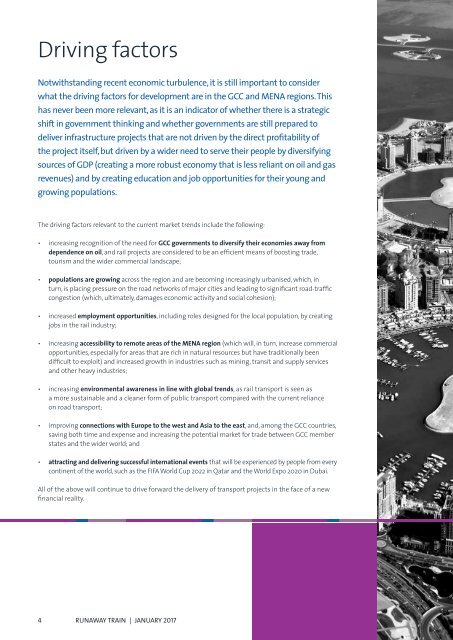Runaway Train
2jdqSdB
2jdqSdB
Create successful ePaper yourself
Turn your PDF publications into a flip-book with our unique Google optimized e-Paper software.
Driving factors<br />
Notwithstanding recent economic turbulence, it is still important to consider<br />
what the driving factors for development are in the GCC and MENA regions. This<br />
has never been more relevant, as it is an indicator of whether there is a strategic<br />
shift in government thinking and whether governments are still prepared to<br />
deliver infrastructure projects that are not driven by the direct profitability of<br />
the project itself, but driven by a wider need to serve their people by diversifying<br />
sources of GDP (creating a more robust economy that is less reliant on oil and gas<br />
revenues) and by creating education and job opportunities for their young and<br />
growing populations.<br />
The driving factors relevant to the current market trends include the following:<br />
• increasing recognition of the need for GCC governments to diversify their economies away from<br />
dependence on oil, and rail projects are considered to be an efficient means of boosting trade,<br />
tourism and the wider commercial landscape;<br />
• populations are growing across the region and are becoming increasingly urbanised, which, in<br />
turn, is placing pressure on the road networks of major cities and leading to significant road-traffic<br />
congestion (which, ultimately, damages economic activity and social cohesion);<br />
• increased employment opportunities, including roles designed for the local population, by creating<br />
jobs in the rail industry;<br />
• increasing accessibility to remote areas of the MENA region (which will, in turn, increase commercial<br />
opportunities, especially for areas that are rich in natural resources but have traditionally been<br />
difficult to exploit) and increased growth in industries such as mining, transit and supply services<br />
and other heavy industries;<br />
• increasing environmental awareness in line with global trends, as rail transport is seen as<br />
a more sustainable and a cleaner form of public transport compared with the current reliance<br />
on road transport;<br />
• improving connections with Europe to the west and Asia to the east, and, among the GCC countries,<br />
saving both time and expense and increasing the potential market for trade between GCC member<br />
states and the wider world; and<br />
• attracting and delivering successful international events that will be experienced by people from every<br />
continent of the world, such as the FIFA World Cup 2022 in Qatar and the World Expo 2020 in Dubai.<br />
All of the above will continue to drive forward the delivery of transport projects in the face of a new<br />
financial reality.<br />
4 <strong>Runaway</strong> train | January 2017


